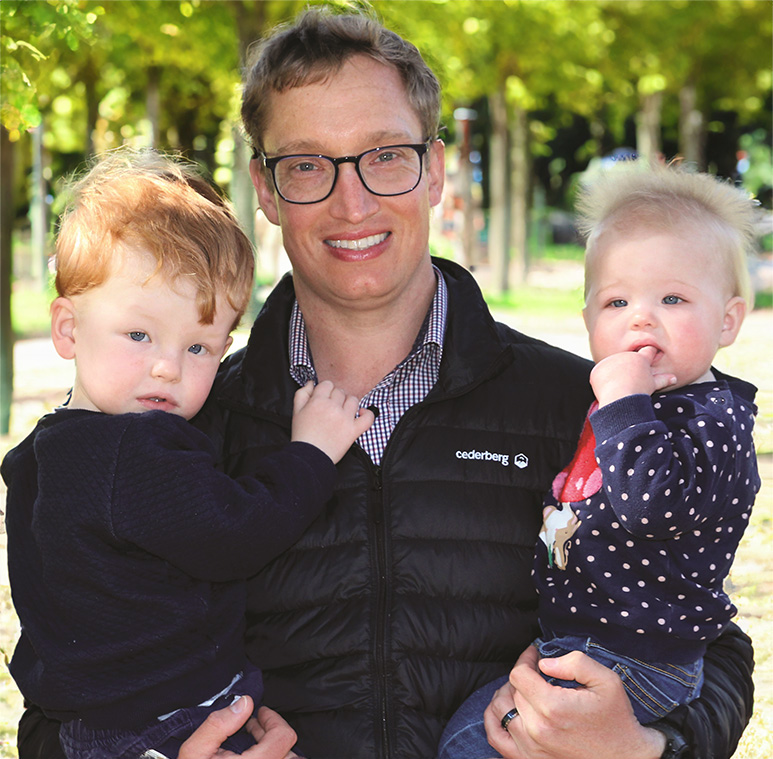New dads can feel undervalued and face significant health and mental health risks following the birth of a child, according to new research that has prompted a rethink about how to address the often-unmet needs of fathers.
The findings were made as part of a wider study evaluating the health of new and expectant fathers, with a particular focus on the risk of diabetes and cardiovascular disease.
The CARE-Dads study involved 498 male expectant or new fathers and aimed to provide them with a health check-up.
Fathers were recruited through The ORIGINS Project, a collaboration between The Kids Research Institute Australia and Joondalup Health Campus, which examines how the early environment can have an impact on the development of a wide range of conditions, such as asthma, obesity, poor mental health, and allergies, in both the child and their parents.
Health data collected on the new and expectant fathers between December 2017 and April 2020 found that of these new dads:
- 46 per cent were overweight and nearly one in three was obese
- A quarter had high blood pressure
- 11 per cent had high cholesterol
- 6 per cent had pre-diabetes
- 40 per cent had low Vitamin-D levels
- 14 per cent had moderate, severe or very severe levels of depressive, anxiety or stress symptoms
- Nearly one in ten were flagged for urgent follow-up (physical or mental health)
Professor Desiree Silva, Director of The ORIGINS Project, led the study alongside Professor Bu Yeap, a consultant endocrinologist and Professor with the Medical School at The University of Western Australia.
“These findings indicate that expectant fathers have substantial cardiometabolic and mental health risks,” Professor Silva said.
“Whether these conditions improve or deteriorate following the birth of their child, how frequently new issues arise, and to what extent these are detrimental to the wellbeing of partners and development of their children, is unclear.”
Professor Yeap said the effect of early referral of expectant fathers with identified issues on their longer-term health was unknown.
“Hence, our ability to help expectant fathers to flourish before and after birth of their child, and improve outcomes for their families, is currently limited.”
The Flourishing in Fatherhood project has now been developed to build on this previous research.
The project aims to address the dearth of knowledge about new fathers and is looking at the challenges to mental and physical health fathers face during their transition to parenthood, along with the impacts these have on the wellbeing of partners and the growth and development of children.
“While antenatal programs help pregnant mothers live healthily to enhance pregnancy outcomes, expectant fathers are often treated as secondary to fertility, birthing and parenting processes,” Professor Silva said.
Our ORIGINS fathers and non-birthing partners have reported that they feel undervalued or irrelevant to the process of having a child. It is all about mum, which is important of course, but the impacts of this on fathering and children are poorly understood.
The study will also pilot a program to help fathers to improve lifestyle behaviours, such as eating habits and exercise, which can improve their overall health and lose weight if necessary.
“There have been a number of studies that have shown that fathers provide important influences on child development in ways that are unique and independent to those of mothers,” Professor Yeap said.
“However, there is little research into the health of expectant fathers, their post-natal health trajectories, and the impacts of this on fathering and children. Therefore, the Flourishing in Fatherhood project will address an important gap in knowledge.”
Professa Silva said fathers who were able to proactively manage their health may become healthier and happier and therefore better partners and fathers.
Support networks important for new dads

Pictured: Hugo, Jacob, and Aria Hammer
Jacob Hammer is one of 600 fathers who will be recruited to the Flourishing in Fatherhood project when it starts in mid-2023.
Dad to three-year-old Hugo and 18-month-old Aria, Mr Hammer said the transition to fatherhood could be tough.
“When Hugo was first born, I felt like I was giving up a part of my life, even though I was gaining so much, too. I did find it quite hard,” Mr Hammer said.
“Cycling and training were a big part of my life, and I just didn’t have the time for it when he first came along. It took some adjustment; life just became a lot more complex.
“It was tricky when Cara, my wife, was breastfeeding, as there was only so much I could do given the baby was always attached to her.
“I did meet up with a few other dads initially, mostly the husbands of the mothers’ group, and it was good to share our experiences, but the support network just isn’t there for dads as it is with mums, I think.”
Next steps
- Results from the project could determine if a simple screening based on questionnaire responses, physical assessment and a blood test, with the provision of a report and recommendations for GP follow-up of specific issues, is beneficial to expectant fathers
- This could be readily adopted as a joint initiative with GPs to develop an antenatal screening/ education program, designed in conjunction with expectant fathers, to run in parallel with current maternal antenatal care provision
